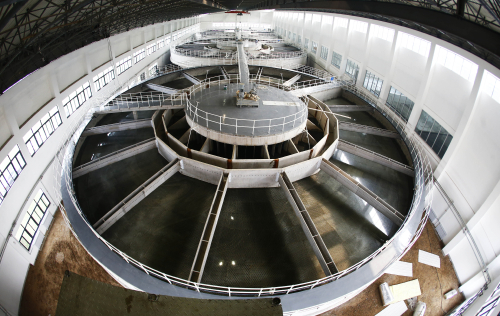 |
|
WATER DIVERSION: The Guogongzhuang water plant in Fengtai District, Beijing, is now prepared for the processing of water from the southern part of the country (YIN GANG) |
Favorable SME Policies
Chinese Vice Premier Zhang Gaoli has reassured small and medium-sized enterprises (SMEs) that supportive measures to help them weather the current downward trend and stimulate economic growth are a priority.
Zhang urged administrations and local authorities to genuinely implement favorable policies announced by the Central Government for SMEs when visiting small firms in east China's Jiangsu Province on October 27.
Governments at all levels should continue to reduce burdens on the SMEs through simplified administrative procedures, tax breaks and improved financing channels, he said.
He stressed that the government should help SMEs to be innovative, to create new intellectual property and establish their own brands, which will make them capable of going out to compete with international rivals.
A government-led service platform to help companies address problems when starting out is also expected, he said.
Small firms are irreplaceable in boosting economic growth, making technological innovations, creating jobs and enhancing people's well-being, Zhang said.
In addition, Zhang called for confidence in China's economy and said the governments should also be clear-headed and make practical efforts in a bid to fulfill major economic and social targets of the year.
LNG Terminal
China's first floating liquefied natural gas (LNG) terminal completed its first phase of construction in the northern port city of Tianjin on October 28.
Covering an area of 75 hectares and designed to supply 3 billion cubic meters of gas each year, it can supply imported LNG to energy-thirsty cities such as Beijing and Tianjin, said the China National Offshore Oil Corp., which owns the terminal.
The facility's two low-temperature storage tanks have a capacity of 30,000 cubic meters of gas each and have been built specifically for the project. Construction began in 2012 with a total investment of 3.3 billion yuan ($537 million).
The terminal is one of the key projects for air pollution prevention in the Chinese capital. It will also supply natural gas to Hebei and Shandong provinces in the long run.
Floating LNG facilities can be moored offshore and allow energy companies to store, regasify and supply LNG close to markets.
Acquisitions Completed
China's state-owned foodstuffs conglomerate COFCO Corp. announced the completed acquisition of controlling stakes in two global agricultural commodities traders on October 28.
COFCO said the two investment deals—a 51-percent stake in Netherlands-based grain trader Nidera and a 51-percent stake in the agricultural unit of Hong Kong-headquartered commodities trader Noble Group—have gone through acquisition examinations and are now complete.
A consortium of investors led by COFCO, including Hopu Investment and Temasek, has taken part in the two deals, with investment from COFCO at over $3 billion, COFCO Chairman Ning Gaoning disclosed at a press conference on October 28.
Nidera, a leading trader of grains and soybeans among other agricultural commodities, has an active presence in more than 20 countries, while Noble Group is one of the world's largest traders in agricultural, minerals and energy products.
Ning said the acquisitions will enable the firm to engage more deeply with the global grain and oil trading platforms and pave the way for the building of an international conglomerate.
After the two deals, COFCO's assets now exceed $57 billion, with revenues amounting to $63.3 billion, according to the company.
Asked whether the firm would conduct more acquisitions, Ning said there will not be any large-scale moves in the near future, but some small ones are likely.
